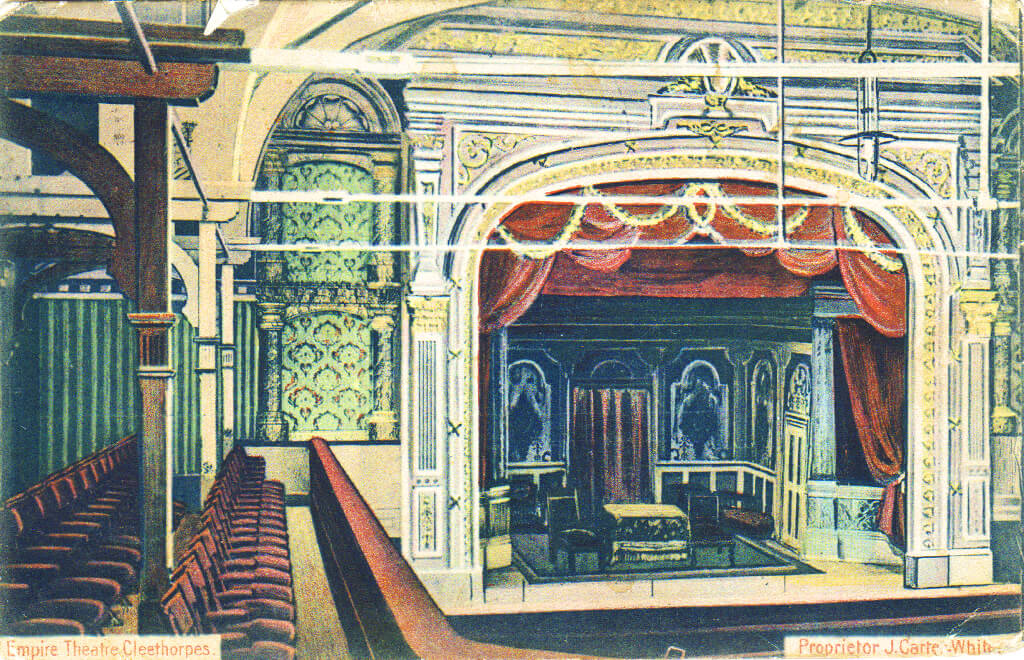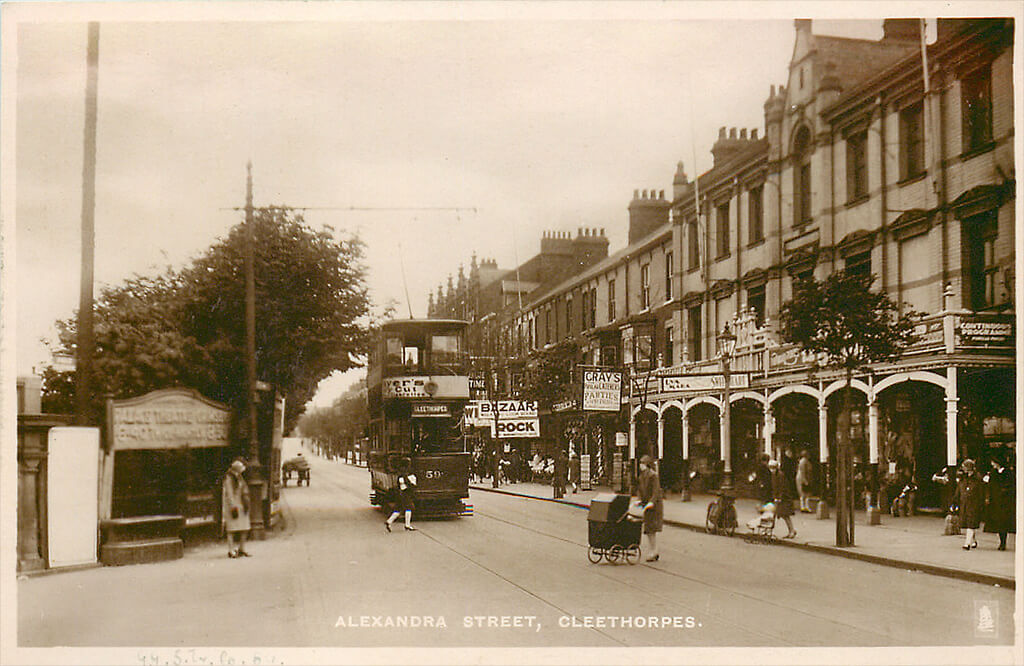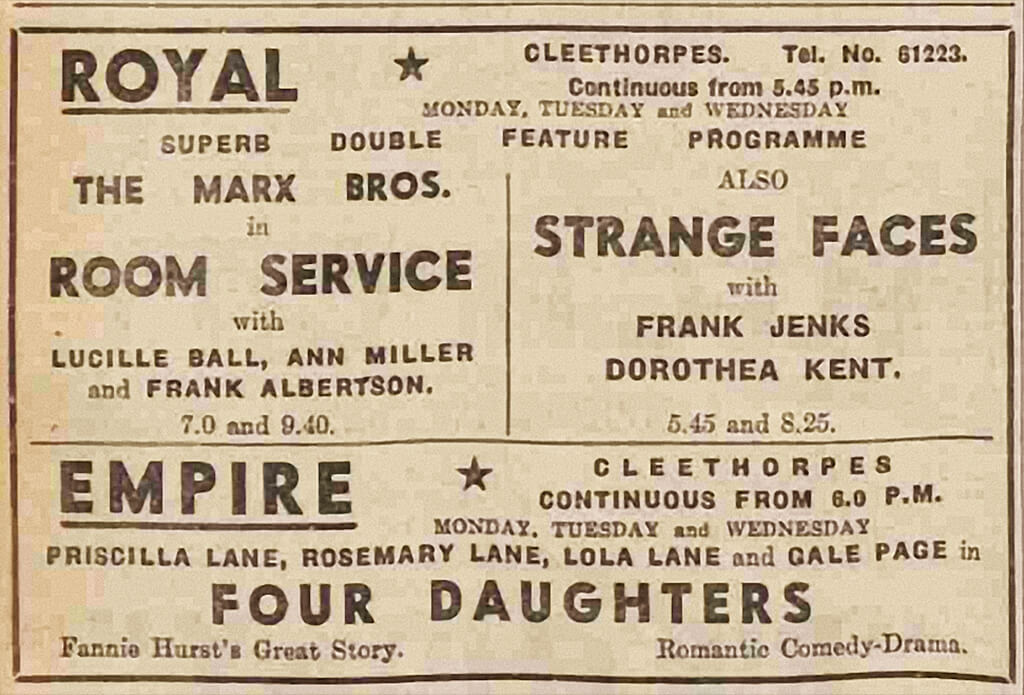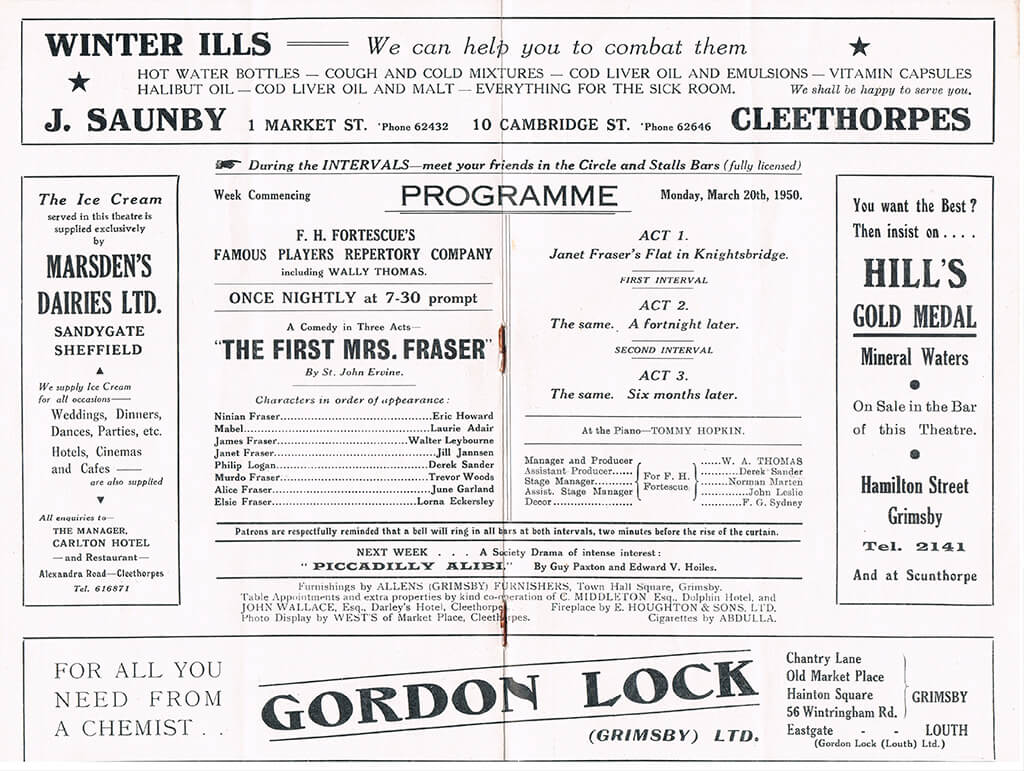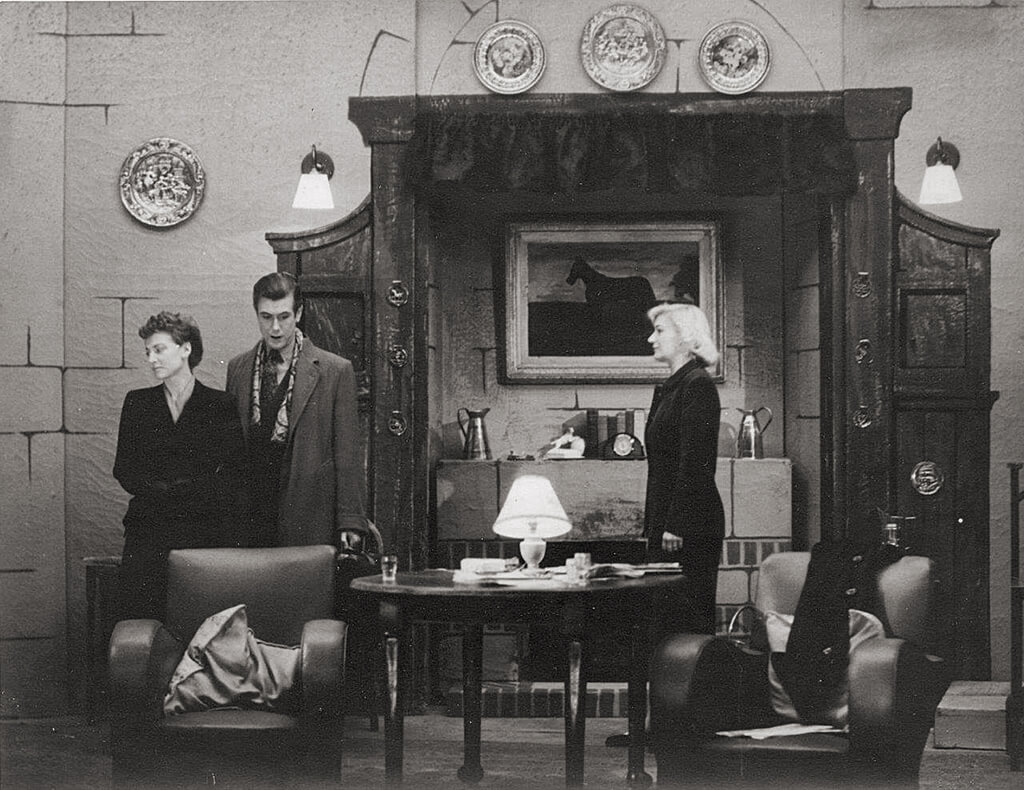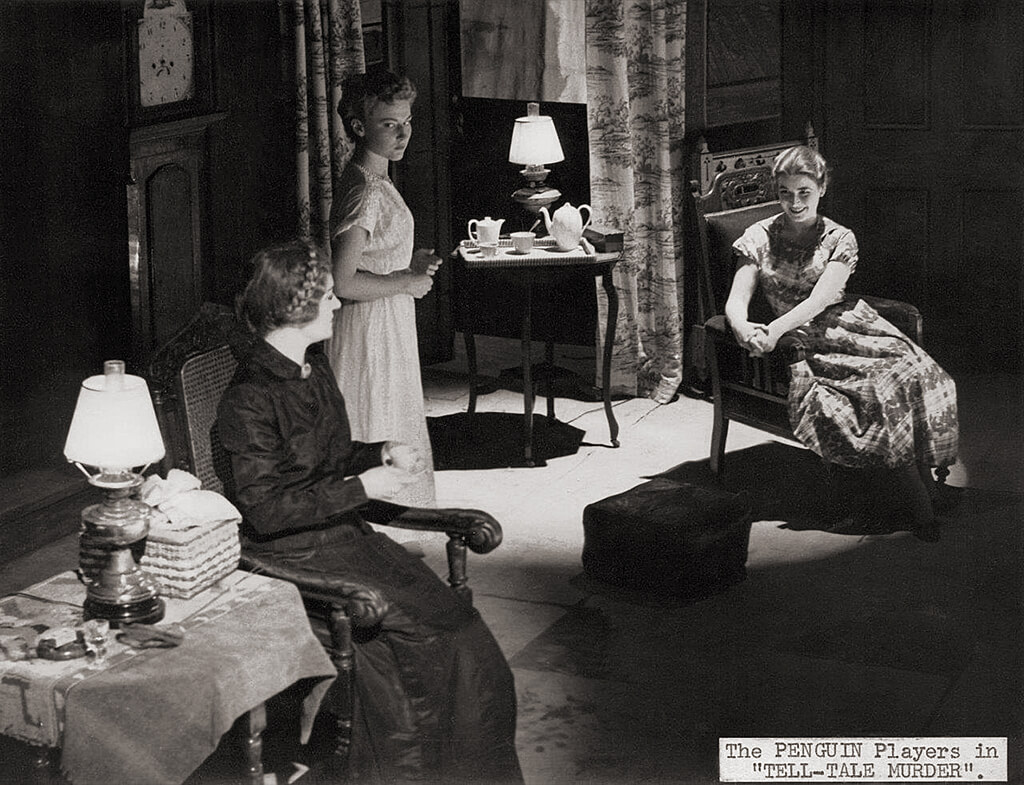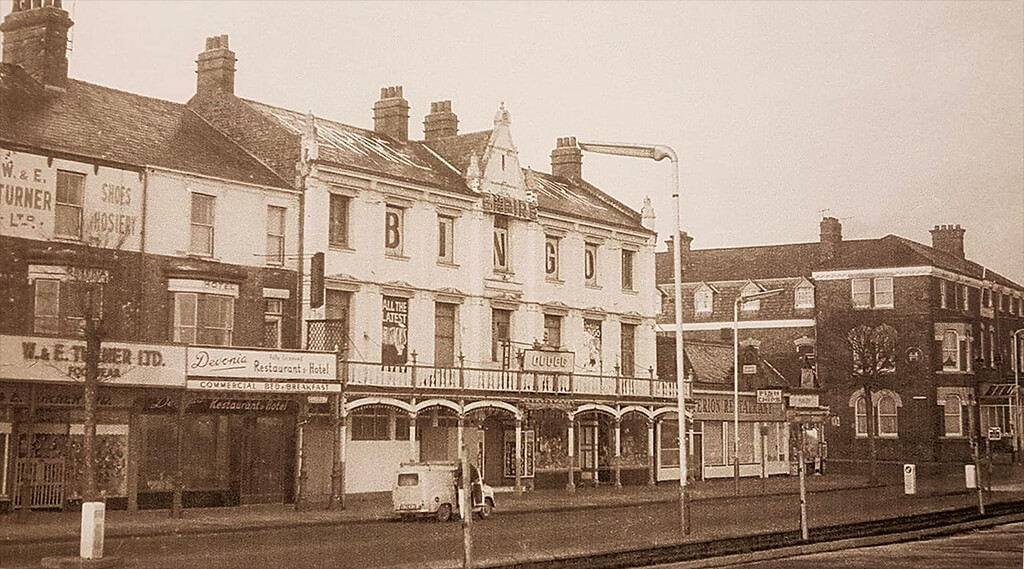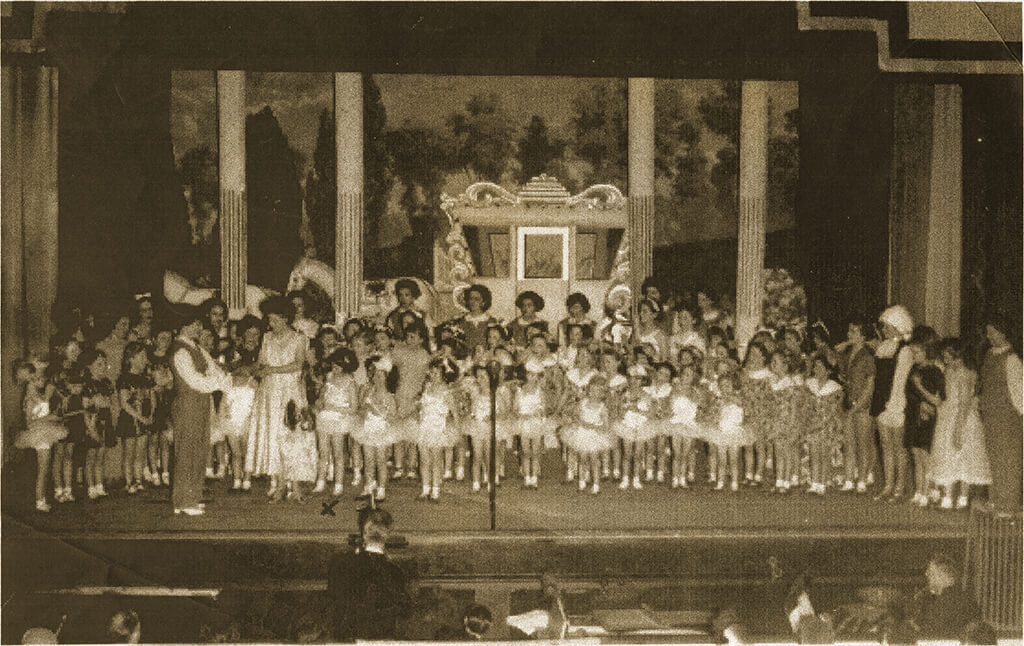An appreciation of the past – with a care for the future
In 1895 a group of prominent local businessmen formed the Cleethorpes Public Hall Co. Ltd and erected the Alexandra Hall Theatre in Alexandra Road, Cleethorpes.
Built as a multi-purpose venue, the frontage formed a three-storey edifice, with an auditorium and stage to the rear. Apart from the ground floor frontage, very little has changed to its external appearance today. The cost was around £4,500 (approximately £600,000 in 2021).
The ground floor and rear auditorium with stage were intended to be a hall that could be used for various functions, not just theatrical, with two to four retail shop units fronting Alexandra Road.
The auditorium was surrounded on three sides by a modest upper circle and two side balconies. It is believed that the hall floor was not raked, unlike many purpose-built theatres, and did not have fixed seating thus enabling it to be used for a variety of functions. In its theatre setting, the hall accommodated up to six hundred and twenty people.
The first floor consisted of two large rooms separated by a small room – a crush lobby that was possibly used as an intimate meeting room.
One of the two larger rooms certainly wouldn’t serve a purpose today as it was designated a smoking room. The other room held two billiard tables – a popular pastime in the Victorian era. This floor was open to the public, probably by means of a membership system.
The second floor was almost a mirror image of the first, but more exclusive – a ‘private’ floor, probably used by the shareholders and their guests.
One room was used as a reading room with a single billiard table whilst the other, was a social club room.
The small dividing central room was designated as a committee room. Both upper floors were managed by one organisation, whilst the theatre hall tended to be managed or leased by a third party.
Whit Monday, May 25th, 1896, saw the ‘New Alexandra Theatre’ open its doors to visitors and locals alike.
The Grimsby News described it as a ‘handsome structure’. William Hillier’s Opera Company put on different classical performances each evening over six days.
Patrons were charged between three shillings (30p) and six pennies (2.5p) for each performance. Throughout June, various melodramas were performed but farcical comedies were the mainstay of the productions presented by visiting theatrical companies.
At the following Easter the theatre showed its first variety act, performed by a multi-talented Mr Hercat, an ‘eminent escamoteur, illusionist, ventriloquist and comedian’.
Sharing the bill was the ‘Cinematographe – living, moving pictures; life endowed photographs.’ Throughout the summer season the primary choice of entertainment was plays – an experiment of variety acts for one week in July only attracted small audiences.
Audience numbers failed to increase over the summer season and were still being reported as low during the 1898 summer season. Residents and visitors to the resort failed to be drawn by variety acts such as, skirt dancers, character comedians, tight wire dancers, impersonators, and singing acrobats.
In 1900 an accomplished Dutch cellist, composer and actor, Auguste van Biene, was appearing at Grimsby’s Palace Theatre when he came upon the ‘sleeping’ Alexandra Theatre.
It was ‘sleeping’ as, presumably due to low audience numbers, no performances took place in 1899. Its appeal had possibly also been tarnished due to a former theatre manager, Sydney Carlton, making numerous court appearances for rowdiness and drunkenness in 1898.
Van Biene took out the lease and set about redecorating and refurnishing the theatre. A local advertisement described the venue as being ‘Prettily decorated … on a lavish scale’ and it ‘is not a music hall but a theatre of select family varieties’.
The theatre became known as ‘The Empire Theatre of Varieties’.
Following van Biene’s three-year tenure the building was purchased by ‘The Empire Company’ in 1903. This was virtually one man, a Grimsby councillor and chemist shop owner, James Carter-White. It was reported that ‘The hall was redecorated, and improvements made in the seating’ before it re-opened on 1st June.
Carter-White was a Freemason and treasurer and in 1903 helped to create Cleethorpes’ first own masonic group – the Lord Worsley Lodge – utilising the upper floor social club room for its meeting room.
After a decade of ownership, in 1913 Carter-White sold the theatre to a new company ‘Cleethorpes Empire Ltd’.
One of the six shareholders was a fellow Freemason, the Chair of Cleethorpes Council and Secretary of the Cleethorpes Gas Company, Edwin Brockway.
To remain viable, places of entertainment had to maintain their appeal to the paying members of the public. Electric theatres, or cinemas, were the up-and-coming trend and Brockway followed it – the ‘Empire Theatre’ became the ‘Empire Cinema’. It proved to be a popular source of entertainment throughout the Great War, especially with its Saturday afternoon children’s matinees.
In 1919 the Coliseum Picture House on Cleethorpes’ High Street (now a public house owned by the Wetherspoon’s company) was purchased by ‘Cleethorpes Empire Theatre Ltd’ and in the same year, the Empire Cinema’s seating capacity was increased from around 620 to around 800. Some live shows were still shown at the Empire – including the annual Cleethorpes Music Festival.
Edwin Brockway, JP died in 1925 but that did not limit further expansion of the company as ‘Cleethorpes Empire Theatre Ltd’ purchased the Theatre Royal on nearby Grant Street two years later.
Although predominantly a cinema, ‘The Royal’ was used for a number of live shows, including those presented by amateur dramatic societies.
Talking movies became increasingly popular and in 1931 the Empire Cinema was equipped with an RCA sound system however, nine years later, the cinema closed.
The War Office requisitioned the building, and it became the Women’s Voluntary Service’s (WVS) ‘Empire Canteen for the Forces’.
Every day for four years volunteers supplied local troops with refreshments, while local children and entertainers utilised the stage for shows to boost the morale of troops stationed locally.
As with many places utilised by the armed forces in World War Two, the theatre was returned for civilian use once more, but in a poor condition.
Charles and Frank Perritt – Perritt Brothers (Theatres) Ltd – refurbished the venue and perhaps surprisingly, reverted it to its previous role as a theatre, opening in the Easter of 1946.
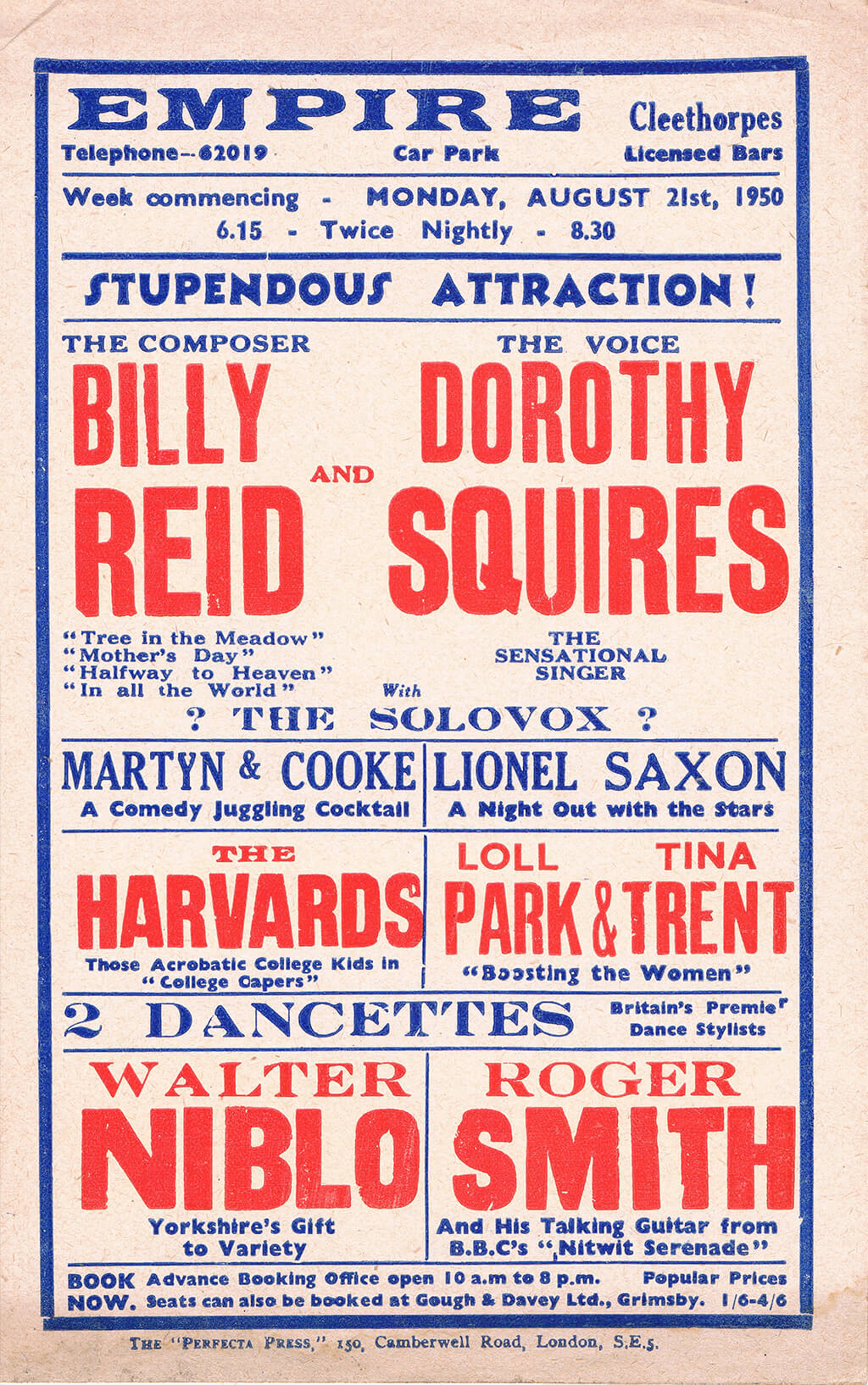
Empire Theatre flyer for week commencing 21st August 1950. Dorothy Squires was joint top of the bill – three years prior to her marriage to actor Roger Moore. She was a popular singer to many people however she failed to impress Jack Webster (Empire Theatre stage manager from 1946 to 1960). Courtesy of Pat Dickens
For several years, the format was predominantly variety shows over the summer season and repertory (rep) companies presenting plays over the winter season.
‘The Denville Stock Company Players’ opened the first winter season, with ‘The Fortescue Players’ taking the reins until 1950. Between 1951 and 1953 ‘The Empire Players’ trod the boards, followed by Rex Deering’s ‘Crown Players/Penguin Players’ from 1954.
Some of the more recognisable artists who have appeared at the Empire Theatre are:
Presenter of TV’s Opportunity Knock’s Hughie Green; actor Molly Sugden; comedy magician Tommy Cooper; actor & singer Julie Andrews, with her parents Ted and Barbara Andrews; actor Diana Coupland; comedy actor Terry Scott; jazz musician Acker Bilk; actor, comedian & singer Harry Secombe; and presenter and entertainer Bruce Forsyth.
Following the 1959-60 pantomime of ‘Babes in the Wood’ the theatre closed until Whitsuntide when it reopened for the summer season, unfortunately, that was to be its last.
The final show was topped by the popular comedian, Jimmy James, before the theatre closed on Saturday 20th August. Television sets were becoming increasingly affordable, and the former audiences felt that they would prefer to be entertained in the comfort of their own homes.
Television did not keep everybody at home though as bingo became ever more popular, so the next phase for the Empire was as an ‘amusement palace’ and the ‘Empire Bingo Club’.
Local shopkeeper Joe Dukes, along with two other people, bought the business around 1963.
In the 1980’s the business is believed to have changed its focus more towards an amusement arcade; two owners during that period were believed to have been Bell Leisure and Whitegate Leisure.
The building was granted grade II listed status in 1988.
A Durham based company, Fairworld Amusements, took over the business in 1992 and promptly stripped out all the former bingo apparatus, along with a seemingly significant amount of the former theatre that remained on the upper floors.
They installed a futuristic ‘Lazer (sic) Quest’ in its place. Enthusiastic players were equipped with lazer guns and chased one another down slides, through ball pools and over an array of obstacles, shooting at targets as they went.
The present owners, R & J Leisure, have owned the venue since 1996 and have recently removed the Lazer Quest equipment from the upper floors, as well as some of the internal walls that were created at the same time.
This has once again opened up the building and it is now much easier to envisage its former role as a theatre and cinema.
The layout of the circle and side balconies are visible, and the upper section of the proscenium arch that separated the stage from the audience is once again on view. Almost the whole of the ceiling and walls of the upper floors were painted black when the Lazer Quest was created, thus disguising many of the remaining theatre’s original features.
A new coat of white paint has gone some way to highlighting these once masked characteristics and several hidden features have now been revealed.
The popular amusement arcade on the ground floor continues to attract both visitors and locals, whilst a period of reflection and consideration is taking place in respect to the upper floors. Another phase in the history of this wonderful 125 year plus Victorian building perhaps?
A few recent pictures of our heritage building
A big thank you to our contributing photographers; Harold McNeill, Pat Dickens, Keith Balcombe, Lee Dixon, George Lill, Mike Bennett and Christopher Hearn for their passion for capturing our glorious past
If you have any memories or photographs that you wish to share, or you have any questions, please contact Dave Smith at empiretheatre.history@gmail.com

